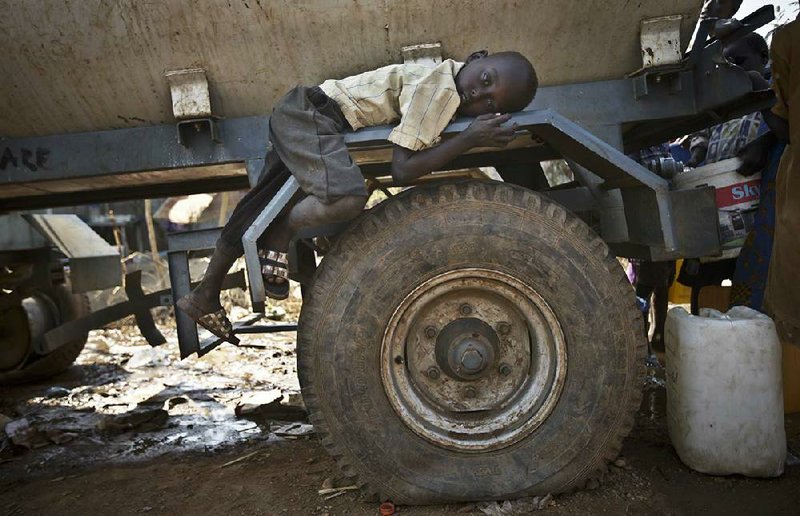JUBA, South Sudan - Anti-government rebels in South Sudan took control of nearly all of a strategic city Tuesday, as officials announced representatives from the government and the rebels agreed to hold talks for the first time.
The announcement that talks would soon take place in neighboring Ethiopia was the first political breakthrough since ethnically based violence began coursing through South Sudan on Dec. 15. The violence has killed more than 1,000 people - a number that is believed to be a low estimate - as the country’s two most powerful ethnic groups fight each other.
The U.S. envoy to the region, Donald Booth, met with President Salva Kiir on Tuesday - their fourth meeting in eight days - and spoke on the phone with the former vice president, Riek Machar, who is accused by the government of trying to carry out a coup, a charge he denies.
Booth said the commitment to meet by the two sides was a “first step but very important step” toward achieving a cessation of hostilities and substantive talks to resolve the underlying political issues that could bring a halt to the violence.
Earlier in the day, heavy fighting broke out in Bor, the provincial capital of Jonglei state, which is a short drive from the South Sudan capital, Juba, and was once controlled by the rebels. Government troops battled renegade forces loyal to Machar, including the Nuer tribal militia known as the “White Army,” military spokesman Col. Philip Aguer said.
South Sudan’s government had been warning of a looming battle for Bor, at one point saying 25,000 armed youths were moving toward the city. That number was later lowered, but enough forces converged Tuesday to take control of most or all of the city, said a senior U.S. official who spoke on condition of anonymity.
Bor is the city where gunfire hit three U.S. military aircraft trying to evacuate American citizens Dec. 21, wounding four U.S. service members. A pro-Machar commander who defected from South Sudan’s military, Peter Gadet, mobilized “elements of the White Army” in a bid to retake the town, Aguer said.
The recapturing of Bor, which is only about 75 miles from Juba, could give Machar an upper hand at the negotiating table. But international officials urged Machar not to move his troops past Bor toward the capital, said an international official, who insisted on anonymity because he wasn’t authorized to speak to media.
On Monday, Ugandan President Yoweri Museveni warned Machar to report to the negotiating table, or “we shall have to go for him, all of us.” Ugandan troops and several of their attack helicopters already were in South Sudan assisting the military, and international officials do not want to see more countries become involved in the warfare. Because of its long years fighting in Somalia, Uganda has perhaps the most seasoned military in East Africa.
Machar appeared to be sending representatives to the negotiating table even though one of his earlier demands - that about a dozen high-level political prisoners being held by the government be released - had not been met. Machar has not repeated his demand in recent days that Kiir step down as president, the senior U.S. official said.
South Sudan has been hit by unrest since Dec. 15, when fighting among presidential guards later spiraled into ethnically based violence across the country. Although an uneasy calm has been restored in Juba, violence persists in other parts of the oil-producing East African country. Rebel forces still control the oil-producing center of Bentiu, Aguer said.
Regional leaders under a bloc known as the Intergovernmental Authority on Development last week set Tuesday as the deadline for Kiir and Machar to start peace talks.
Although Kiir has insisted the latest unrest was sparked by a coup mounted by soldiers loyal to Machar, this account has been disputed by some officials of the ruling party who said violence broke out when presidential guards from Kiir’s majority Dinka tribe tried to disarm guards from the Nuer ethnic group of Machar.
The U.N. mission in South Sudan said in a statement Tuesday that it was “gravely concerned about mounting evidence of gross violations of international human rights law” across South Sudan since mid-December. “Extra-judicial killings of civilians and captured soldiers have occurred in various parts of the country,” the statement said.
South Sudan has been plagued by ethnic tension and a power struggle within the ruling party that escalated after Kiir sacked Machar as his deputy last year. Machar has criticized Kiir as a dictator and said he will contest the 2015 presidential election.
The U.N., South Sudan’s government and other analysts say the dispute is political at its heart, but has since taken on ethnic dimensions. The fighting has displaced up to 180,000, according to the U.N.
Information for this article was contributed by Rodney Muhumuza and Elias Meseret of The Associated Press.
Front Section, Pages 6 on 01/01/2014

